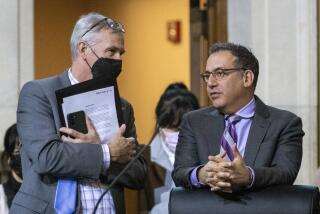10 Firemen Added to Paramedic Force
- Share via
The San Diego City Council on Tuesday approved a two-year program that would add 10 firefighter/paramedics to the existing, private paramedic service.
Proponents say the new system will shorten paramedic response times in areas where response has been relatively slow, but Mayor Maureen O’Connor contended that the compromise decision will give some areas of the city better paramedic services than others.
The city manager’s office said that, at minimum, paramedic response times will not get worse for anyone. City standards now require that, for 95 of every 100 calls, paramedics must respond within 10 minutes.
The council’s decision creates a blend of paramedic services using the fire department and Hartson’s Medical Service, the private company that provides paramedic services through a city contract.
If everything goes according to plan--a final City Council decision on the change is due in December, with implementation next July--the Fire Department will train 10 firefighters to be paramedics. Until now, only Hartson’s paramedics served the city.
The firefighter/paramedics will be assigned to fire trucks in “hard-to-serve” areas of the city.
The city estimates that by having the firefighter/paramedics with the first fire truck on the scene, emergency medical care will be provided within 5 minutes in 90 out of 100 calls.
The firefighter/paramedics would provide initial emergency care while waiting for two Hartson’s paramedics to arrive in an ambulance, as they do under the current system.
“In addition to significantly improving response times, most particularly in the isolated and low-density perimeter areas of the city, this shared system would also provide a larger pool of cross-trained firefighter/paramedics in case of multicasualty disasters,” according to a city manager’s report. The areas to be served by the firefighter/paramedics have not been determined, but the city so far has found that paramedic response times tend to be slower in North City, North City West, South Bay, San Carlos, Ocean Beach, Mission Beach, Pacific Beach, parts of La Jolla and some other outlying areas.
While the city manager’s staff concluded the shared Hartson’s-fire department system “would enhance emergency medical service delivery” in San Diego, it wasn’t their first choice. The city manager had recommended that the fire department take over paramedic services, in the process putting paramedics on all fire trucks responding to medical emergencies.
This was the system the mayor favored because even though there have been no complaints about Hartson’s paramedics arriving on time anywhere in the city, firefighters get to emergencies first.
She cited clinical information provided by the city showing that immediate medical treatment is a major factor in surviving some life-threatening emergencies such as heart attacks and respiratory failure.
“When patients experience a sudden cardiac arrest, their chances of survival are decreased by 7 to 10% for every one-minute delay in the provision of advanced life support,” according to the city manager’s report.
“We know we can go to a better system for about the same cost and save lives,” O’Connor said.
The cost of implementing the full Fire Department paramedic system--not including the cost to contract with Hartson’s--was estimated at between $400,000 and $500,000 the first year, decreasing to about $10,000 the next year and then breaking even.
“If you care about life and death . . . a fully implemented Fire Department (paramedic system) is the better system,” she said.
She raised the ire of some council members when she said the change to a shared-paramedics system would lead to some areas of town receiving better services than others, since only 10 of 42 fire units would have firefighter-paramedics.
Councilman Bob Filner accused the mayor of being “unfair” and “irresponsible.”
He said the council was not deciding to “provide one area much better care than another . . . but (this will) improve response time for all the city.” Filner said the “facts” today are that those closest to paramedic services get help faster.
Several other council members, including Wes Pratt and Abbe Wolfsheimer, said they had received almost no citizen complaints about the city’s current paramedic services, and the city manager’s office has said the system is working fine.
Part of the reason the city sought a change was due to a labor dispute at Hartson’s several month ago that city officials said threatened the city’s contract with the company. The city was afraid it might be left without paramedic services and would have to rely on a poorly prepared and equipped fire department.
Wolfsheimer said she was concerned about the start-up costs of the fire department-based system, which the city had extensively studied.
The city manager’s office will now negotiate a two-year extension of the city contract with Hartson’s.
Deputy City Manager Coleman Conrad told the City Council he expected the city’s contract with Hartson’s plus training the 10 firefighters would cost the city about $2.6 million in fiscal year 1992 and $2.8 million in fiscal 1993, which is what Hartson’s had proposed to the city for all paramedic services.
The city will negotiate with Hartson’s on the precise details of the shared paramedic system, including costs and which areas of the city will receive the firefighter/paramedics. That contract will come back to the City Council for approval in December, Conrad said.
Monday’s vote was 6-2, with the mayor and Councilman Bruce Henderson in opposition. Councilwoman Judy McCarty was absent.
After the vote, Conrad told reporters, “The important thing for people to understand is that no one will end up having a worse response time . . . the idea is to negotiate a better” response time.
Hartson’s top executive, Glen Roberts, said that the new shared system will lead to better service for San Diego residents living in outlying and isolated areas. He said Hartson’s average paramedic response time in the city is 6 1/2 minutes.
More to Read
Sign up for Essential California
The most important California stories and recommendations in your inbox every morning.
You may occasionally receive promotional content from the Los Angeles Times.










